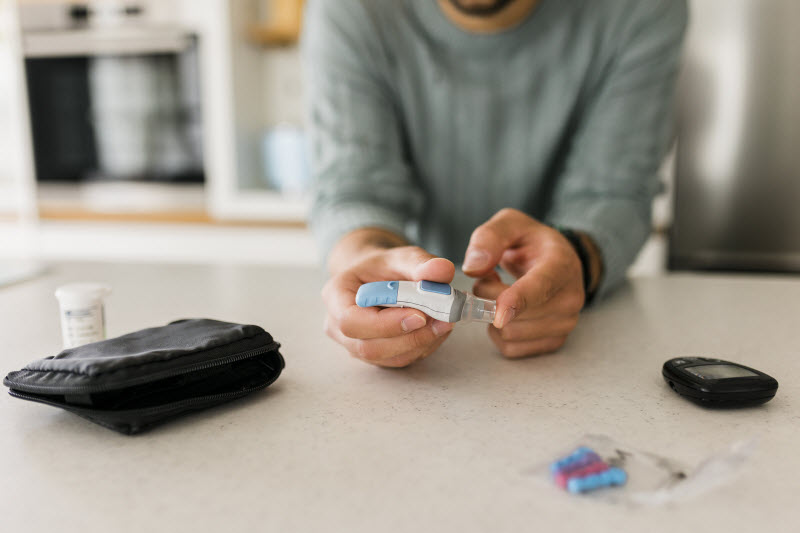[vc_row][vc_column][vc_column_text]
Diabetes is one of the nation’s most common – and deadliest – diseases. But what causes diabetes?
Poor diet plays an overwhelming role in your risk of developing the illness, according to a new study.
Researchers who modeled dietary intake in 184 countries found that poor diet contributed to more than 70% of new diagnoses of type 2 diabetes worldwide during 2018.
Findings of the study -- conducted by researchers at Friedman School of Nutrition Science and Policy at Tufts University -- were published in a recent edition of the journal Nature Medicine.

Three factors appear to play an especially large role in promoting type 2 diabetes:
- Low consumption of whole grains
- High consumption of refined rice and wheat
- High consumption of processed meats
Changing your diet to something more healthful – and taking other steps, such as becoming more active – can significantly lower your risk of being diagnosed with type 2 diabetes.
Making such changes can pay off for those hoping to live a longer, more fulfilling life, says Rita Smith, a registered dietitian with Sentara Martha Jefferson Hospital in Charlottesville, Virginia.
“Maybe it is to have more active time with grandchildren, to travel in retirement or to embark on a new career,” she says.
What is diabetes?
Diabetes is a disease that affects more than 37 million adults, according to the Centers for Disease Control and Prevention. There are two primary types of diabetes:
- Type 1 diabetes. Occurs when your body stops making insulin. Experts believe it is the result of an autoimmune reaction.
- Type 2 diabetes. Occurs when your body is unable to properly use the insulin it produces.
Type 2 diabetes is by far the more common type of diabetes, affecting between 90% and 95% of people with diabetes, the CDC says.
Unlike with type 1 diabetes -- which comes on quickly and causes symptoms right away -- type 2 disease usually develops slowly over many years. In fact, people commonly do not experience symptoms during the early course of the illness.
About 20% of people with diabetes are unaware that they have the disease, the CDC says.
The ramifications of having diabetes can be serious. It is the chief cause of kidney failure, lower-limb amputations and blindness in adults. Diabetes also is the seventh-leading cause of death in the U.S.
What raises your risk of diabetes?
There is no way to prevent type 1 diabetes, according to the CDC. But you can take several steps to lower the risk of being diagnosed with type 2 diabetes.
Chief among them is losing weight and eating healthier foods. The
CDC notes that people who are overweight or obese -- which makes up a startling 74% of U.S. adults -- are at greater risk of developing type 2 diabetes.
Other factors also can contribute to an
increased risk of diabetes.
They include:
- Age. Those 45 and older are at higher risk
- Family history. You are at higher risk if a parent or sibling has the disease
- Lack of physical activity. Those who get less than 150 minutes a week in activity are at increased risk
- History of gestational diabetes. Women who had diabetes during pregnancy or who gave birth to a baby who weighed more than 9 pounds are at increased risk
- Race. Those who are African American, Hispanic/Latino American, American Indian or Alaska Native are at increased risk
Improving your diet to ward off diabetes
Just about everyone can
reduce their risk of type 2 diabetes by eating a better diet.
For those who are overweight, shedding pounds can play a major role in keeping diabetes at bay.
“With less body fat, the insulin released from the pancreas is used more effectively and efficiently,” Smith says.
If you are trying to shed pounds, Smith recommends selecting foods that are lower in calories and rich in nutrients.
“The best approach is with small gradual changes in food choices that can be continued for a lifetime, versus drastic cuts or wild-and-crazy diets that are impossible to follow for any length of time,” Smith says.
A lunchtime sandwich on a big white-flour kaiser roll might contain 300 calories and offer no fiber, Smith notes. So, replace that roll with two slices of whole-grain bread at 70 calories and 2 grams of fiber per slice.
The net result is “a 160-calorie saving and a fiber boost of 4 grams,” Smith says.
Even if you are not overweight or obese, eating a healthy diet can reduce your risk of developing type 2 diabetes. For such folks, Smith recommends choosing foods that promote a gradual rise in glucose levels.
“That means looking at the type and quality of carbohydrate foods, selecting modest servings of higher-fiber options,” she says. “Then, easy replacements or adjustments can be made.”
For example, she suggests:
- Apple slices rather than apple juice
- Bean soup rather than chicken noodle soup
- Brown rice rather than white rice
- Filling half your dinner plate with non-starchy vegetables instead of a large serving of meat and starches
- Adding berries to breakfast cereal for a fiber boost
Remember that you do not have to make all these changes at once, Smith says. Instead, take things one step at a time.
“Eating something at
breakfast -- even just a banana -- is better than skipping breakfast and overeating at lunch,” she says. “A short 10-minute walk is better than sitting on the couch.”
Staying the course and keeping diabetes under control
Many people who have type 2 diabetes can regain control of their health simply by losing weight and improving their diet. But you must maintain such a diet for the rest of your life if you want to retain those health gains, Smith says.
“Even if diabetes is in excellent control, a healthful diet needs to continue for those glucose numbers to stay in the desired range,” she says. “As soon as a person goes back to old eating habits or regains weight, glucose levels will move back upward.”
Sticking with your new eating habits can be challenging, as the temptation to return to eating tasty – but unhealthy – foods can be difficult to resist.
To stay the course, Smith suggests the following steps:
Ask for the support of family, friends and co-workers.
Let loved ones know how and why you have changed your diet so they don’t unknowingly sabotage your efforts.
“When friends come to watch an evening sporting event on TV, ask them to bring a raw veggie platter, cheese and whole-grain crackers, and nuts, rather than a jumbo sausage pizza or bags of chips,” Smith says.
Plan meals in advance.
Smith recommends taking a little time each week to loosely
plan upcoming weekly menus with a variety of wholesome, high-fiber carbohydrate foods at each meal. “For example, Friday might be a veggie pizza on whole-grain crust to share with the family, and a large vegetable salad or veggie platter,” she says.
Find an exercise buddy.
A daily walk can boost your health, but this activity is more likely to be enjoyable and sustainable if you do it with a partner. “Someone else is also depending upon that walk or exercise for their health, too,” Smith says. “You both have an investment in the exercise that you choose.”[/vc_column_text][/vc_column][/vc_row][vc_row][vc_column][vc_text_separator title="Featured Products" border_width="2"][vc_row_inner equal_height="yes" content_placement="middle" gap="35"][vc_column_inner width="1/3"][vc_single_image image="166656" img_size="full" alignment="center" onclick="custom_link" img_link_target="_blank" css=".vc_custom_1683239888922{padding-right: 7% !important;padding-left: 7% !important;}" link="https://www.vitacost.com/natures-way-completia-multivitamin-diabetes-iron-free"][/vc_column_inner][vc_column_inner width="1/3"][vc_single_image image="166655" img_size="full" alignment="center" onclick="custom_link" img_link_target="_blank" css=".vc_custom_1683239908941{padding-right: 7% !important;padding-left: 7% !important;}" link="https://www.vitacost.com/vitacost-synergy-blood-sugar-support-with-gymnema-chromium"][/vc_column_inner][vc_column_inner width="1/3"][vc_single_image image="166657" img_size="full" alignment="center" onclick="custom_link" img_link_target="_blank" css=".vc_custom_1683239925851{padding-right: 7% !important;padding-left: 7% !important;}" link="https://www.vitacost.com/terry-naturally-sucontral-d-blood-sugar-balance-120-capsules"][/vc_column_inner][/vc_row_inner][/vc_column][/vc_row]
 Three factors appear to play an especially large role in promoting type 2 diabetes:
Three factors appear to play an especially large role in promoting type 2 diabetes:



